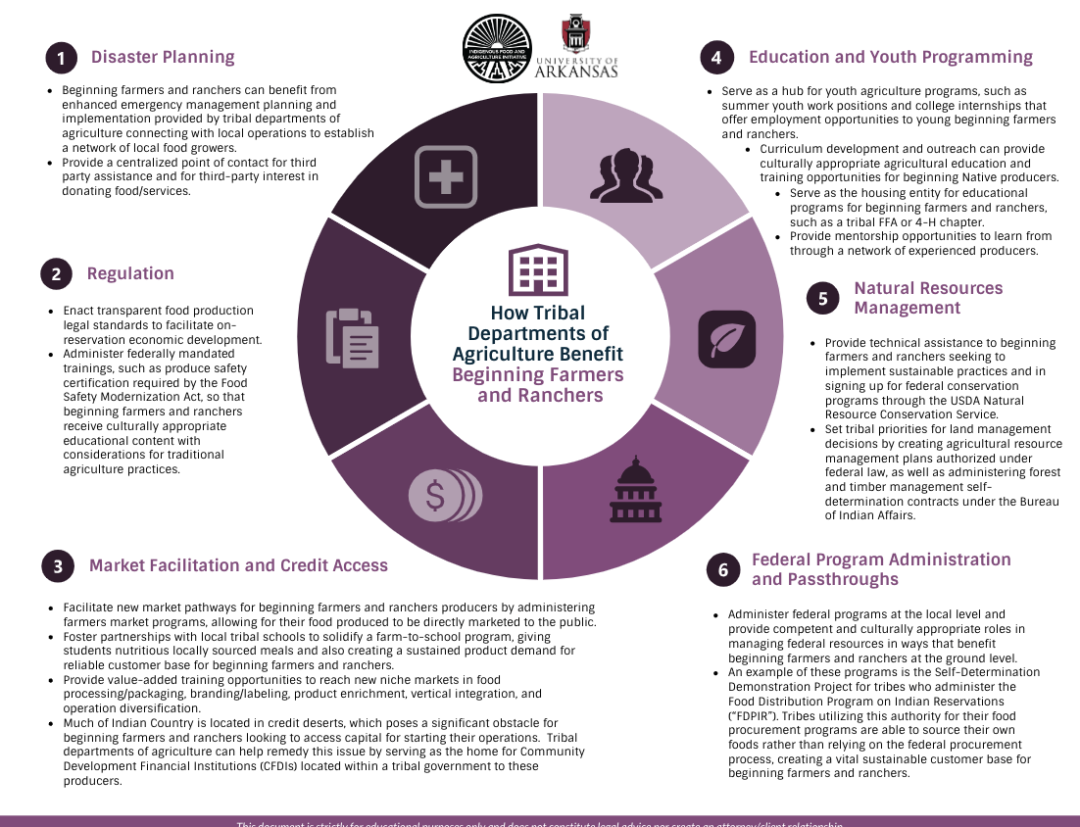Disaster Planning
- Beginning farmers and ranchers can benefit from enhanced emergency management planning and implementation provided by tribal departments of agriculture connecting with local operations to establish a network of local food growers.
-
Provide a centralized point of contact for third party assistance and for third-party interest in donating food/services.
Regulation
- Enact transparent food production legal standards to facilitate on-reservation economic development.
-
Administer federally mandated trainings, such as produce safety certification required by the Food Safety Modernization Act, so that beginning farmers and ranchers receive culturally appropriate educational content with considerations for traditional agriculture practices.
Market Facilitation and Credit Access
- Facilitate new market pathways for beginning farmers and ranchers producers by administering farmers market programs, allowing for their food produced to be directly marketed to the public.
- Foster partnerships with local tribal schools to solidify a farm-to-school program, giving students nutritious locally sourced meals and also creating a sustained product demand for reliable customer base for beginning farmers and ranchers.
- Provide value-added training opportunities to reach new niche markets in food processing/packaging, branding/labeling, product enrichment, vertical integration, and operation diversification.
- Much of Indian Country is located in credit deserts, which poses a significant obstacle for beginning farmers and ranchers looking to access capital for starting their operations. Tribal departments of agriculture can help remedy this issue by serving as the home for Community Development Financial Institutions (CFDIs) located within a tribal government to these producers.
Education and Youth Programming
- Serve as a hub for youth agriculture programs, such as summer youth work positions and college internships that offer employment opportunities to young beginning farmers and ranchers.
-
Curriculum development and outreach can provide culturally appropriate agricultural education and training opportunities for beginning Native producers.
-
Serve as the housing entity for educational programs for beginning farmers and ranchers, such as a tribal FFA or 4-H chapter.
-
Provide mentorship opportunities to learn from through a network of experienced producers.
Natural Resources Management
- Provide technical assistance to beginning farmers and ranchers seeking to implement sustainable practices and in signing up for federal conservation programs through the USDA Natural Resource Conservation Service.
- Set tribal priorities for land management decisions by creating agricultural resource management plans authorized under federal law, as well as administering forest and timber management self-determination contracts under the Bureau of Indian Affairs.
Federal Program Administration and Passthroughs
- Administer federal programs at the local level and provide competent and culturally appropriate roles in managing federal resources in ways that benefit beginning farmers and ranchers at the ground level.
- An example of these programs is the Self-Determination Demonstration Project for tribes who administer the Food Distribution Program on Indian Reservations (“FDPIR”). Tribes utilizing this authority for their food procurement programs are able to source their own foods rather than relying on the federal procurement process, creating a vital sustainable customer base for beginning farmers and ranchers.
Frequently Asked Questions
Why do beginning farmers and ranchers in Indian Country need a tribal department of agriculture when their state of residence already has an established department of agriculture?
As residents of their home state, beginning farmers and ranchers are often eligible for services from their state’s department of agriculture. Many tribal nations have robust partnerships with their state counterparts in serving Indian Country. However, tribal departments of agriculture can offer the same services as the state departments of agriculture while taking into account traditional practices and incorporating culturally appropriate training and outreach services. These departments are also more versed in the nuanced issues facing Indian Country, such as access to credit. This combination allows tribal departments of agriculture to serve beginning farmers and ranchers in Native communities in ways that state departments of agriculture often cannot.
How can beginning farmers and ranchers be sure that a tribal department of agriculture will not create significant regulatory burdens for them?
Beginning farmers and ranchers may face some additional regulation from their tribal department of agriculture, however this is often not the main focus of these entities because they are often charged with addressing the needs of producers in the forms of technical assistance, outreach, and training in addition to addressing needs specific to their constituency. If regulatory burdens are a concern, one must remember that the framework of tribal department of agriculture is a product of sovereignty being exercised. This allows tribal citizens and their leaders to be in the driver’s seat in determining the path of the department that will ultimately serve them.
Why would beginning farmers and ranchers benefit from a tribal department of agriculture rather than letting stand-alone programs be located throughout the tribal government structure?
Beginning farmers and ranchers will ultimately benefit from a tribal department of agriculture over having many stand-alone programs throughout their tribal government because it will serve as a “one-stop-shop” for all their needs. Often times in tribal governments – especially the larger ones – one may have trouble locating the right resources for their specific need, which may not be the best when dealing with a time-sensitive problem. Access to a tribal department of agriculture allows for a streamlined effort in addressing the needs and inquiries from beginning farmers and ranchers, allowing them to focus more on their livelihood rather than navigate administrative bureaucracy.

